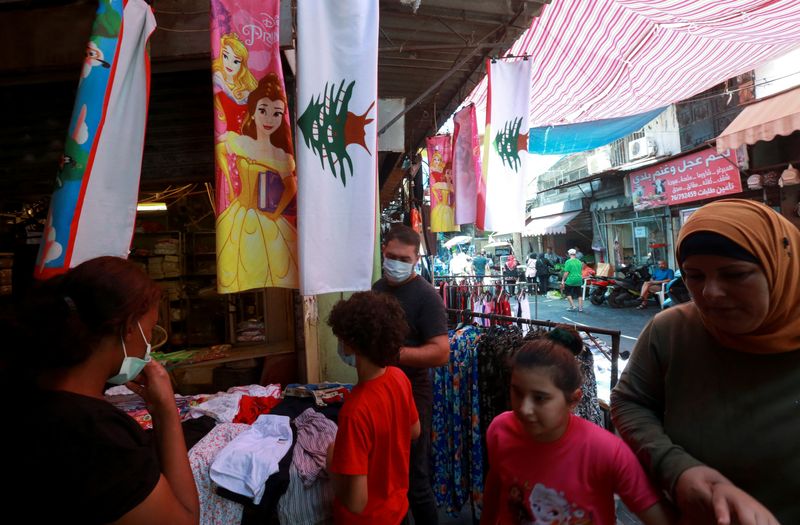By Maya Gebeily, Timour Azhari and Tom Perry
BEIRUT (Reuters) - Five months after Lebanon's draft IMF deal raised hopes it could finally pull together an economic reform plan to address its financial meltdown, political and financial elites are obstructing prospects of securing any rescue package.
Efforts to enact eight reforms sought by the IMF are going nowhere or falling short, hitting resistance from politicians who are shielding vested interests and dodging accountability.
It means Lebanon will likely have little to present to the Fund's annual board meeting in October to back its quest to unlock $3 billion in aid, and adds to doubts over whether the government will ever come up with a plan to address the crisis.
Last week, the IMF told the government that its only attempt so far at legislative reform to tackle the three-year economic crisis - amendments to the banking secrecy law - still retained "key deficiencies", after MPs watered down the original text, according an IMF legal brief seen by Reuters.
Adding to the dim outlook, a plan for plugging a hole in the national finances - some $72 billion and growing - faces objections, including banks that say it puts too much of the burden on them.
The latest pushback came on Thursday from a group of business leaders and former officials who launched their own version of the recovery plan reflecting some of the banks' concerns.
Without such a plan, an early version of which was torpedoed by politicians and bankers in 2020, ordinary savers are paying the price, locked out of deposits in a frozen banking system where the value of their cash has plunged since 2019.
"It's clear that there’s no political will to reform," said law-maker Ibrahim Mneimeh. "You can’t separate the politics from the economics – especially not in Lebanon."
The inaction adds to concerns the ruling elite - accused by the World Bank of deliberately orchestrating the crisis - will let it fester indefinitely.
The crisis is fuelling poverty, a brain drain and a risk of instability in a country with a history of civil war.
Despite the lack of progress, there is no suggestion the IMF will walk away. While the draft deal urges timely implementation of reforms, it sets no deadline.
The government says it remains committed to the IMF track, seen as the only way out of a crisis rooted in years of corruption, waste and unsustainable financial policies.
"MAGICAL" SOLUTIONS
Some are pinning their hopes elsewhere, anticipating that unproven offshore gas fields may one day provide salvation, though these could take years to develop. The Iran-backed Hezbollah has said this is the only solution.
Lebanese banks have also backed a proposal to use part of future oil and gas reserves to plug the financial gap, an idea experts on IMF thinking say would not be acceptable to the fund.
"There is a belief in a magical solution - oil and gas," said Camille Abousleiman, a finance lawyer and former minister.
"This is no substitute for fundamental reform."
He cited vested interests and a lack of "ethical leadership" as causes of inaction by politicians, who managed to cling to power after the election despite the crisis.
Meanwhile, dollar reserves representing what's left of depositors' funds are being depleted. The central bank said in June they had dropped $2.2 billion in 2022 to about $11 billion.
The watered-down amendments to the banking secrecy law show the resistance to reform.
An early draft allowed the lifting of banking secrecy to investigate "all financial crimes" but the version approved by parliament in July weakened it, allowing only some government bodies to lift it in cases of specific crimes.
The IMF brief seen by Reuters suggested parliament reinstate the nixed clauses.
DIVIDING LOSSES
The dispute over how to distribute the financial sector losses remains a complication.
The government plan, drawn up Deputy Prime Minister Saade Chami, aims to do this in a way that protects depositors and the state, writing off a chunk of central bank debt to commercial banks, which would shoulder big losses, echoing IMF principles.
Under the alternative plan launched on Thursday by the Lebanese Economic Organizations, banks would bear responsibility but without pushing the sector towards bankruptcy, its chair, ex-minister Mohamed Choucair, said, local media reported.
Four sources familiar with the plan said it would flip the hierarchy of claims.

Lebanon has made almost no progress on the rest of the to-do list, which Chami had hoped would be completed by September so that the IMF board could be approached by October.
The political calendar does not bode well. President Michel Aoun leaves office on Oct. 31 with no sign yet of agreement on who should replace him, while the government has been operating in a caretaker capacity since the May election due to divisions over a new cabinet.